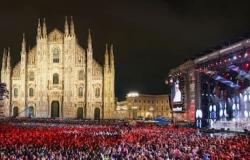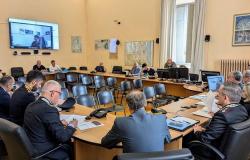Venice, Teatro Malibran, Symphonic Season 2023-2024 of the Teatro La Fenice
La Fenice Theater Orchestra
Conductor, flute and transverse flute Federico Maria Sardelli
Principal violin Roberto Baraldi
Soprano Michela Antenucci
Music by Antonio Vivaldi
Venice, 14 June 2024
A cross-section of Venetian musical life in the eighteenth century – a tribute to Antonio Vivaldi and the places linked to his art – opened at the Malibran Theater in the recent concert of the 2023-2024 Symphonic Season, which featured the maestro Federico Maria Sardelliat the helm ofLa Fenice Theater Orchestra, and the soprano Michela Antenuccibeyond Roberto Baraldi as principal violin. Fresh from the success achieved, again at La Fenice, with The Bajazet, the Tuscan director – interpreter and scholar of reference regarding the Red Priest: among other things, member of the Vivaldi Institute of the Giorgio Cini Foundation of Venice and responsible for the Vivaldi catalog (RV) – performed in the double role of director and soloist (on flute and flute traversiere). The evening began with Concerto in D minor for principal violin, organ, strings and continuous bass (RV 541), which ideally transported us to the Ospedale della Pietà – the female orphanage, where Vivaldi worked for around forty years, between 1704 and 1740 -, as it belongs to the group of concerts for violin and concertante organ, which – to regardless of the title, devoid of religious indications – they often served to open or close the liturgical celebrations, which took place in the Institute, with a ‘putta’ on the violin and another on the organ. Roberto Baraldi’s violin was impeccable, showing off a soft and round sound, a technical mastery particularly evident in the agility, a conscious adaptation to the Vivaldian stylistic code (probably thanks to maestro Sardelli). He gave him an orchestra – here as elsewhere – snappy and sensitive, cohesive as a whole, impeccable in the interventions of the various sections or individual instruments as in the continuous bass.
This was followed by a series of pieces mainly of liturgical music, a genre which, together with musical theatre, occupied Vivaldi assiduously: among them the extraordinary motet In very righteous fury (RV 626), one of the dozen motets that remain to us from the approximately one hundred composed and then sent by post to various courts. Michela Antenucci’s performance was brilliant, demonstrating that she is at ease in a light-lyrical vocal context, standing out for her pure and ringing timbre, her widespread effective diction, her clear articulation in her agility. A veritable feast of orchestral colors revealed itself Concert for the Solemnity of San Lorenzo (RV 556) – one of the concerts written to solemnize important occasions, great liturgical events or the visit of a passing prince – in which the violins, flutes, clarinets and bassoon excelled. As the title indicates, the occasion for which the Concerto was composed is the feast of San Lorenzo; however, we do not know the year of composition nor which institution commissioned the work; however, it cannot be the Pietà, because the bassoon was not used there. More likely, the commission came from the rich female convent of San Lorenzo, which welcomed respectable scions of Venetian patrician families, offering them the opportunity to learn to play a vast range of instruments.
A ‘theatrical’ parenthesis opened with the air “Always cover the dark night” (RV 738), a fragment from the famous Titus Manliusone of those works in which Vivaldi uses, in the arias, a large number of concertante instruments: the horns, the trumpet, the viola d’amore or, as in the aria presented this evening, the flute, played by Sardelli with virtuosic dexterity and stylistic composure to accompany one of the most intimate moments of the work, in which the orchestra is silent and the instrument dialogues with the continuous bass and the voice. Who – in the case of Michela Antenucci – was able to effectively interact with the solo instrument, demonstrating sensitivity and control of the technical-expressive means.
The timbral parameter still dominated in the Concerto in C major for two clarinets and two oboes (RV 559), where Vivaldi – the first and only one in Italy – used the clarinet, a rather new instrument at the time, built shortly before in Nuremberg by Johann Cristoph Denner. Vivaldi’s choice to include it in the score was an absolute novelty, an avant-garde operation, which proposed a sound never before heard by the public. A real pleasure for the ears was listening to the two pairs of concert instruments – two oboes and two clarinets – responding to each other, competing with two voices.
We returned to the sacred Vivaldi with the conclusion Laudate pueri (RV 601 ), written at the beginning of the 1930s and sent – together with other pieces, which were to constitute an essay of bravura – to Dresden, where the author hoped that the new Prince Elector would nominate him Kapellmeister or gave him an important position at that court, where he was highly esteemed, primarily by the concert master Johann Georg Pisendel, already his student in Venice. Michela Antenucci’s performance – which corresponded to that of Federico Maria Sardelli, also as a soloist on the flute – in tackling this beautiful intonated version of Psalm 112, written for a soprano voice, is exciting in terms of dexterity in the arduous coloraturas and musicality. extended even up to the high D. This Vivaldi of his late maturity is magnificent! The same one that makes up the Bajazet: a modern musician, who uses the traversiere as a concert instrument, also because he knew that this instrument was highly appreciated at the Dresden court. Nonetheless, his hope of moving to the German city will be dashed. However, at the end of the evening, the Malibran audience was anything but disappointed, applauding for a long time, deserving a BIS: the pyrotechnic Amen from the Laudate pueri.
For Latest Updates Follow us on Google News






